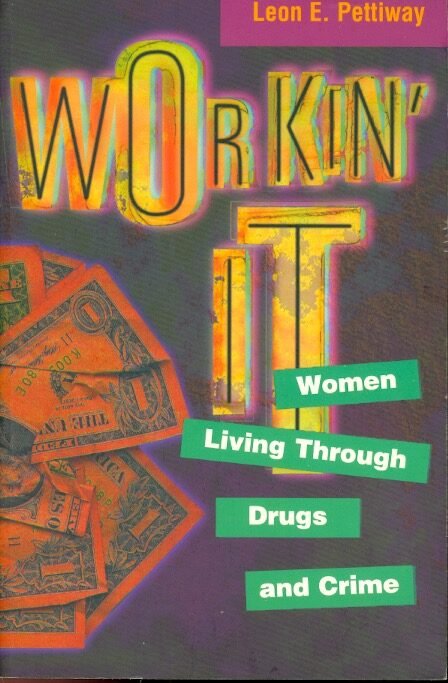Workin’ It
Women Living Through Drugs And Crime
Margaret, Charlie, Virginia, Tracy, and Laquita are all drug users involved in regular criminal activity: prostitution, burglary, shoplifting, robbery, drug selling, petty theft, and various kinds of fraud. Four of the women are black; one is white and Puerto Rican. While all five have been involved in same-sex relationships, three are primarily straight and two are primarily lesbian. They come from working-class or welfare families; some women characterize their mothers as strict, abusive, intolerant, and distant while other mothers are characterized as concerned, religious, and loving. The women talk frankly about their drug use, their sexual and criminal activities, their childhoods, their school and work experiences, their neighborhoods, their personal relationships with their families of origin, children, and partners, their fears and future goals, and the ordinary trapping of their lives.
These women share a web of experiences created out of race and ethnicity, sexual orientation, drug use, and urbanization that provides them with meaning and courage. They speak movingly about guilt and responsibility, about rape and intimacy, and about ambition and despair. Through their stories, we can grasp the traumas and turning points that lead us all to make bad decisions as well as those ideals and inspirations that can help to redeem us.
Order Now
"When I look back on my addiction, I wish I had never started. I wish I had never started and wished my mother was there a little bit more. I wish she was there to stop me, to tell me don’t do that. I wouldn’t give it to my worst enemy. That’s how bad it can get.
To my mother I wish I had never stole from her or cussed her out ‘cause she be in my business—you know, telling me to calm down and don’t do this and take care of the children and “you mean to tell me this drug mean more to you than your babies?” shit like that—and I would just cuss her out and steal from her. I wish I hadn’t had done that. As for my children, I just wish . . . that goes back to wishing I had never started. ‘Cause my mom told me one day she said she wish they were never born. “Wish you never birthed them.” That was painful. Oh man!"
Excerpt from Workin’ It
REVIEWS
“What Workin'It manages to accomplish is to offer, in the narratives of five women, some compelling testimony about real lives damaged by membership in a society that inadequately values such lives. The book serves as a timely reminder of the complexity of the racial and class dimensions of a number of contemporary issues, including and in particular the slow suicide of drug addiction. The book does this while also offering insight into the lived perspectives of the inner city poor who bear the brunt of social and political policies that may be driven as much by fear and misunderstanding (and by a degree of racism) than by enlightenment.”
—Thomas Conroy, Vol. 20 Deviant Behavior: 281
“The book is relevant to those studying crime and criminality, regardless of any singular interest in women. The life histories of the women provide the reader with a deep and personal insight into the intimacies of the socially excluded in America. Any distress caused while reading such accounts only adds impetus to the need to comprehend the realities of such a group, and re-assess the social policy interventions.”
—D. J. Patton, The British Journal of Criminology, Vol. 39(3): 471-473
Pettiway foregrounds the women’s voices and experiences through entire chapters based on their first-person narratives, a strategy that contests the popular cultural pathologization of street sex workers. Pettiway’s deeply humanizing accounts of women’s derailed dreams, their decision-making strategies, and their experiences as impoverished, addicted people of color present an accessible introduction to this population.
—Susan Dewey, Labor: Vol 9(2): 112-132
Pettiway sets out to provide a "deliberately noninterpretive work" (p. xiv). However, as his introduction indicates, he clearly also has goals in mind in presenting this material; he seeks to give voice, dignity, and humanity to the women he interviews. This is a laudable ambition, especially given much of the extant literature on women drug users, which often presents them in the most degraded manner imaginable, and is certainly both voyeuristic and exploitative. Pettiway seeks to turn our attention to ways these women resist oppression and their abilities to define themselves and ultimately to construct lives of value.
—Dana Britton, Contemporary Sociology, Vol. 27(6):647-648



